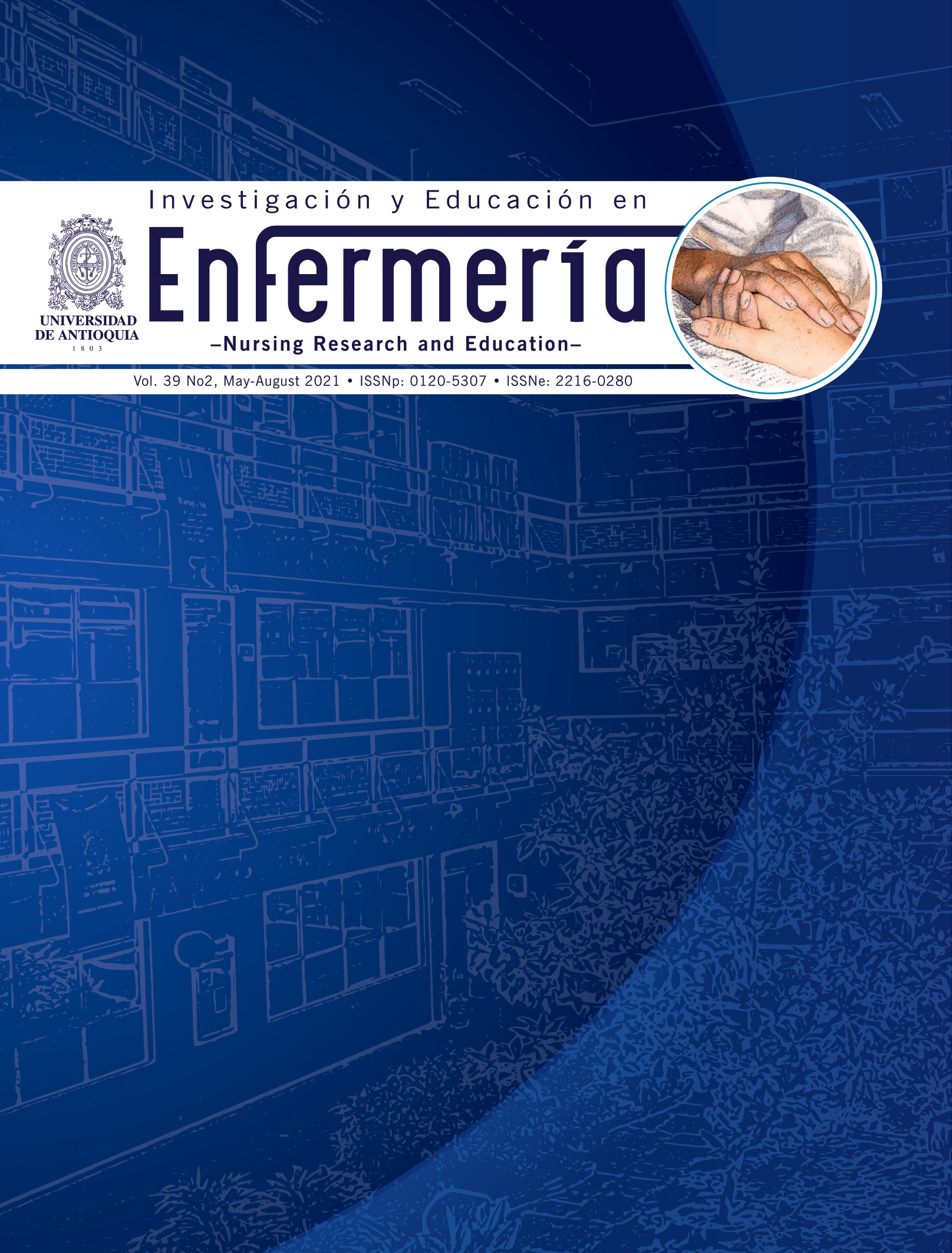Experiences of Parents of Preterm Children Hospitalized Regarding Restrictions to Interact with Their Children Imposed Because of the COVID-19 Pandemic
DOI:
https://doi.org/10.17533/udea.iee.v39n2e10Keywords:
pandemics, coronavirus infections, neonatal nursing, infant, premature; parents, intensive care units, neonatal, family nursingAbstract
Objective. To describe the experiences of parents of hospitalized preterm children regarding the restrictions implemented in the neonatal intensive care unit -NICU- during the COVID-19 pandemic.
Methods. Qualitative study. Semi-structured interviews were conducted between April and October 2020 with 12 parents of preterm children, whose children were hospitalized and discharged from NICU during the pandemic. The analysis was performed with tools from grounded theory through open and axial coding.
Results. The study identified four categories regarding the experience: 1) needing information: refers to the need for clear and close information to compensate for the physical distance; 2) limiting the interaction with the children: expressed as a painful situation, which minimizes opportunities for learning to care at home for their preterm child; 3) the pandemic: adding to the fears: in which the virus appears as a new threat for the children, who are vulnerable given their premature condition; and 4) limiting social support after discharge: identifies that the parents had less family and professional support for care after discharge during times of pandemic.
Conclusion. Parents of preterm children lived a difficult experience that became complex within the context of the pandemic. The experiences of parents of preterm children during times of COVID-19 indicate that restrictions to enter neonatal units to prevent the virus transmission limited the interaction with the preterm child and with the health staff and increased the needs for information.
Downloads
References
Knight M, Bunch K, Vousden N, Morris E, Simpson N, Gale C, et al. Characteristics and outcomes of pregnant women admitted to hospital with confirmed SARS-CoV-2 infection in UK: national population-based cohort study. BMJ. 2020; 369:m2107.
World Health Organization. Coronavirus (COVID-19) Dashborad [cited 12 Apr2021)]; 2021. Geneva: WHO. Available from: https://covid19.who.int/
Raschetti R, Vivanti AJ, Vauloup-Fellous C, Loi B, Benachi A, De Luca D. Synthesis and systematic review of reported neonatal SARS-CoV-2 infections. Nat. Commun. 2020; 11(1):5164.
Vohr BR. The importance of parent presence and involvement in the single-family room and open-bay NICU. Acta Paediatr. 2019; 108(6):986-8.
Kokorelias KM, Gignac MAM, Naglie G, Cameron JI. Towards a universal model of family centered care: a scoping review. BMC Health Serv. Res. 2019; 19(1):564.
Davidson JE, Aslakson RA, Long AC, Puntillo KA, Kross EK, Hart J, et al. Guidelines for Family-Centered Care in the Neonatal, Pediatric, and Adult ICU. Crit. Care Med. 2017; 45(1):103-28.
Gómez-Cantarino S, García-Valdivieso I, Moncunill-Martínez E, Yáñez-Araque B, Ugarte Gurrutxaga MI. Developing a Family-Centered Care Model in the Neonatal Intensive Care Unit (NICU): A New Vision to Manage Healthcare. Int. J. Environ. Res. Public Health. 2020; 17(19):7197.
Cypress BS. Rigor or Reliability and Validity in Qualitative Research: Perspectives, Strategies, Reconceptualization, and Recommendations. Dimens. Crit. Care Nurs. 2017; 36(4):253-63.
Lakshmanan A, Agni M, Lieu T, Fleegler E, Kipke M, Friedlich PS, et al. The impact of preterm birth <37 weeks on parents and families: a cross-sectional study in the 2 years after discharge from the neonatal intensive care unit. Health Qual. Life Outcomes. 2017; 15(1):38.
Provenzi L, Santoro E. The lived experience of fathers of preterm infants in the Neonatal Intensive Care Unit: a systematic review of qualitative studies. J. Clin. Nurs. 2015; 24(13-14):1784-94.
Amorim M, Alves E, Kelly-Irving M, Silva S. Needs of parents of very preterm infants in Neonatal Intensive Care Units: A mixed methods study. Intensive Crit. Care Nurs. 2019; 54:88-95.
Kim H, Wyatt T, Li X, Gaylord M. Use of social media by fathers of premature infants. J. Perinat. Neonat. Nurs. 2016; 30(4):359–66.
Silva RMMD, Zilly A, Nonose ERDS, Fonseca LMM, Mello DF. Care opportunities for premature infants: home visits and telephone support. Rev. Lat-Am Enfermagem. 2020; 28:e3308.
Klawetter S, Greenfield JC, Speer SR, Brown K, Hwang SS. An integrative review: maternal engagement in the neonatal intensive care unit and health outcomes for U.S.-born preterm infants and their parents. AIMS Public Health. 2019; 6(2):160-83.
O'Brien K, Robson K, Bracht M, Cruz M, Lui K, Alvaro R, et al. Effectiveness of Family Integrated Care in neonatal intensive care units on infant and parent outcomes: a multicentre, multinational, cluster-randomised controlled trial. Lancet Child Adolesc. Health. 2018; 2(4):245-54.
Michalec B, Lamb G. COVID-19 and team-based healthcare: The essentiality of theory-driven research. J. Interprof. Care. 2020;34(5):593-9.
Lake ET. How effective response to COVID-19 relies on nursing research. Res. Nurs. Health. 2020; 43(3):213-4.
Soares RF, Christoffel MM, Rodrigues E, Machado MD, da Cunha AL. Ser pai de recém-nascido prematuro na unidade de terapia intensiva neonatal: da parentalidade a paternidade. Esc. Anna Nery. 2015; 19(3):409-16.
Green J, Petty J, Bromley P, Walker K, Jones L. COVID-19 in babies: Knowledge for neonatal care. J. Neonatal Nurs. 2020;26(5):239-46.
Downloads
Published
How to Cite
Issue
Section
License
Copyright (c) 2021 Investigación y Educación en Enfermería

This work is licensed under a Creative Commons Attribution-NonCommercial-ShareAlike 4.0 International License.
Derechos de propiedad / Direitos de Propriedade
English: If the article is accepted for publication, all copyright will be of exclusive property of Investigación y Educación en Enfermería. The text and the graphics included in the publication are exclusive responsibility of the authors and not necessarily reflect the thought of the Editorial Committee.
Español: Si el artículo es aprobado para publicación, todos los derechos son de propiedad de Investigación y Educación en Enfermería. El texto y las gráficas incluidas en la publicación son de exclusiva responsabilidad de los autores y no necesariamente refleja el pensamiento del Comité Editorial.
Português: Se o artigo for aceito para publicação, todos os direitos autorais serão de propriedade exclusiva de Investigación y Educación en Enfermería. O texto e os gráficos incluídos na publicação são de responsabilidade exclusiva dos autores e não refletem necessariamente o pensamento do Comitê Editorial.















